Where Is Amanda Knox Now? Inside Her Life After Acquittal — and Why She’s Still Clearing Her Name
Amanda Knox was exonerated by Italy’s highest court in 2015

Paula Lobo/Disney General Entertainment Content/Getty
Amanda Knox on 'Good Morning America' in 2018.The case of Amanda Knox gripped the world’s attention for years.
In November 2007, Knox — then a 20-year-old Seattle college student studying abroad in Perugia, Italy — found herself at the center of a murder investigation when her roommate, 21-year-old British exchange student Meredith Kercher, was found dead, partially clothed and with her throat slashed in their apartment.
Italian authorities were quick to point the finger at Knox and her 23-year-old boyfriend, Raffaele Sollecito, and accused the couple of murdering Kercher in a sadistic sex game gone wrong.
Following her arrest, Knox faced trials in both Italian court and the media. After initially being found guilty on murder charges, she spent four years in an Italian prison before her conviction was overturned in 2011. Knox returned to the United States, but her ordeal didn’t end there: In 2013, she was retried and convicted once again before finally being exonerated by Italy’s Supreme Court in 2015.
Since coming back to the U.S., Knox has been focused on rebuilding her life and reclaiming her identity: As a wife, a mother and an advocate for the wrongfully convicted.
“There is no way I can go back to being the person who I was before all of this happened,” she said on Nightline in 2016. “I’m forever marked ... and the important thing moving forward is just acknowledging that, and acknowledging that I’m not the only one.”
She added, “I’m going to take ownership of the fact that I’m an exoneree and I’m going to share the fact that there is a voice to be heard.”
Most recently, Knox tried to overturn her 2009 conviction for slander related to a confession she made about her former boss, Patrick Lumumba, during the investigation. Although an appellate court in Florence, Italy, upheld the original ruling in June 2024, she may consider appealing it again, per her lawyer.
From life before her wrongful conviction to everything that’s happened since her acquittal, here’s an in-depth look at where Amanda Knox is now.
Knox was born and raised in Seattle
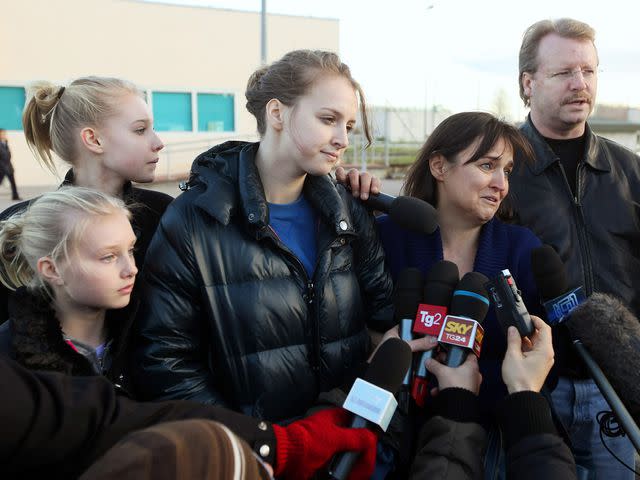
Oli Scarff/Getty
Amanda Knox's parents Edda Mellas and Curt Knox with her sisters in 2009.Born on July 9, 1987, Knox is the oldest child of Edda Mellas, an elementary school math teacher originally from Germany, and Curt Knox, a finance executive. Edda and Curt had a second daughter together, Knox’s younger sister Deanna, before divorcing in 1989 when Knox was a toddler, according to The Seattle Times.
Knox grew up with her mother and Deanna in a middle-class neighborhood in West Seattle. (She also has two younger half-sisters, Ashley and Delaney.) She earned a scholarship to attend Seattle Preparatory School — where she performed in school plays and excelled at soccer, according to Vanity Fair.
It was on the soccer field as a child that Knox was given the now-infamous nickname “Foxy Knoxy” because she was quick like a fox (and not a promiscuous co-ed, as the tabloids later portrayed her).
After graduating from Seattle Prep in 2005, Knox went on to attend the University of Washington in Seattle, where she studied creative writing, German and Italian, according to The Guardian.
While a college student, Knox worked three jobs to save up $10,000 to study abroad in Perugia, Italy, during her junior year, her parents told The Seattle Times.
One of Knox’s roommates in Italy, Meredith Kercher, was murdered in 2007
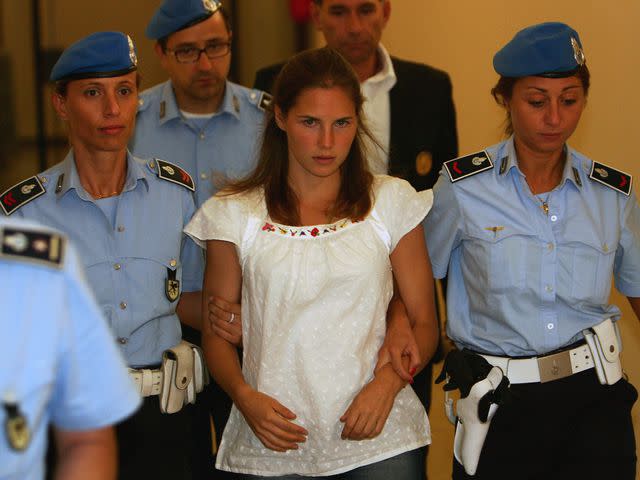
Federico Zirilli/AFP/Getty
Amanda Knox at a court hearing in Perugia in 2008.Knox’s case dates back to 2007 when she was 20 years old and began studying abroad in Perugia. She lived in a ground-floor, four-bedroom apartment with three roommates: two Italian women, Filomena Romanelli and Laura Mezzetti, and a British exchange student, Meredith Kercher, from the University of Leeds.
During her time abroad, Knox studied Italian at the University for Foreigners and held a part-time job at a bar called Le Chic. Amid her studies and work, she began dating a 23-year-old Italian man named Raffaele Sollecito.
On Nov. 2, 2007, after spending the night with Sollecito, Knox claimed she returned to the apartment to find the door slightly ajar, drops of blood in her bathroom, feces in the toilet and Kercher’s door locked. She made a call to Kercher’s phone, which went unanswered, and to her mother back in Seattle.
“She said, ‘Mom, I’m okay, I’m home, but I think somebody might have been in my house,’ ” Mellas told The Seattle Times.
According to Knox’s account of the morning, she then took a shower and returned to Sollecito’s home. The two came back to the apartment together and attempted to open Kercher’s door. When they couldn’t gain entry, Sollecito called the Italian military police.
Italian police quickly arrived, but not the ones Sollecito had called — two postal police had found two phones in a nearby garden and traced them to the home.
When the postal police, who handle communications-related crimes, refused to knock down the door, a friend of Romanelli’s kicked down Kercher’s door, according to Rolling Stone. They found Kercher dead, her throat slashed and her partially clothed body covered by a duvet.
Knox spent four years in an Italian prison for the murder of Kercher
Rather than returning home to Seattle following the discovery of Kercher’s body, Knox stayed in Italy to help with the case. She was detained by Italian police for questioning and interrogated for 53 hours over five days without any legal counsel or interpreter present.
“I was hit on the back of the head, I was yelled at. Police were coming in and out of the room telling me that I was a liar,” she told Nightline about the interrogation. “It was chaos. It was utter chaos.”
Knox eventually signed a confession that put her at the crime scene and implicated Patrick Lumumba, her boss at Le Chic. Knox, Sollecito and Lumumba were arrested on Nov. 6, 2007, and held on conspiracy to commit manslaughter and sexual violence.
Lumumba was released without charge two weeks later after his alibi was corroborated, while Knox was held in prison awaiting trial.
Before Knox and Sollecito’s trial began, a third individual — 21-year-old Rudy Guede, who had moved to Perugia from the Ivory Coast at age 5 — was arrested in connection with Kercher’s murder.
Guede, whose fingerprints were found at the crime scene and whose DNA was found in and on Kercher’s body, was granted a fast-tracked trial, separate from Knox and Sollecito, in September 2008, according to The New York Times. A month later, he was found guilty of murder and sexual assault and sentenced to 30 years in prison by an Italian judge.
Despite Guede’s conviction, Knox and Sollecito were still indicted on murder charges, and their trials began in January 2009. After two years in prison and an 11-month trial, an Italian jury found both Knox and Sollecito guilty on charges of sexual violence and murder. Though prosecutors were seeking life in prison, Knox was sentenced to 26 years.
Knox was acquitted in October 2011 — and was fully exonerated in 2015
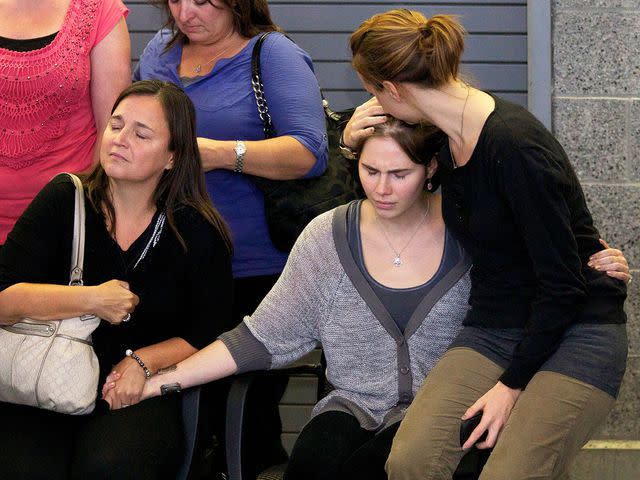
Stephen Brashear/Getty
Amanda Knox with her sister, Deanna Knox, and mother Edda Mellas during a press conference in 2011.Knox and her lawyers appealed her conviction, and on Oct. 3, 2011 — nearly four years after Knox was arrested in connection with Kercher’s murder — an Italian appeals court overturned the most serious charges against her.
The two judges and six jurors only upheld one minor charge: defamation, for implicating her former boss, Lumumba, in her signed confession to the police. The charge was made in 2009 while she was imprisoned.
Knox was given credit for time served and released after four years behind bars. During her appeals trial, Knox took the stand to proclaim her innocence.
“I did not kill. I did not rape. I did not steal. I wasn’t there. I wasn’t there at the crime,” she said during her 10-minute testimony.
Following her acquittal, Knox boarded a flight home to Seattle on Oct. 4, 2011. But her ordeal was not over: In March 2013, an Italian court ordered a retrial of her case. Nearly a year later, she and Sollecito were found guilty of murder again. Knox and Sollecito were reconvicted because the nature of Kercher’s wounds indicated that Guede did not act alone, the judges explained.
Knox was sentenced to 28 ½ years in prison, while Sollecito received a 25-year sentence. However, Knox told Good Morning America that she would “never go willingly back” to Italy to serve her sentence. (Italy never attempted to extradite Knox to serve her second sentence.) “It’s not right, and it’s not fair,” she added.
Knox’s nightmare finally came to an end in March 2015 when Italy’s highest court of appeals overturned her and Sollecito’s convictions, later citing “stunning flaws” in the investigation and a lack of evidence.
“I am tremendously relieved and grateful for the decision of the Supreme Court of Italy,” Knox said in a statement obtained by PEOPLE. “The knowledge of my innocence has given me strength in the darkest times of this ordeal.”
In 2016, the Associated Press reported that the European Court of Human Rights (ECHR) ruled that Knox's rights had been violated during her interrogation. In response, she appealed the slander conviction, and a retrial of the case began in the Florence appeals court on April 10, 2024.
Two months later, the appellate court upheld the initial 2009 ruling and she was sentenced to three years in prison, but she won't be serving additional jail time since it counts as time served, per the AP.
According to Knox's lawyer, Carlo della Vedova, who spoke to the Today show, he will evaluate the written decision before deciding if they should appeal again.
Knox wrote a New York Times best-selling memoir, Waiting to Be Heard, in 2013

Ida Mae Astute/Disney General Entertainment Content/Getty
Amanda Knox on 'Good Morning America' in 2013.In her post-prison life, Knox completed her undergraduate degree in creative writing at the University of Washington, began writing an arts column for the West Seattle Herald and, in 2013, she penned a memoir about her ordeal titled Waiting to Be Heard.
Knox received a $3.8 million advance from HarperCollins Publishers for the book, which promised to tell “the full story from her point of view for the very first time,” according to Jonathan Burnham, publisher at HarperCollins. That said, the advance didn't add to Knox's net worth; instead, she used the money to pay back loans from her family and to pay her legal fees.
“People just assume Amanda must be wealthy because she wrote a book,” her now-husband Christopher Robinson told PEOPLE in 2017. “But that $3.8 million is long gone.”
He continued, “She paid back her parents and grandma, who took out mortgages to move to Italy during her case and pay her lawyers. And she still has massive legal bills.”
She appeared in an Emmy-nominated Netflix documentary about her case

Lou Rocco/Disney General Entertainment Content/Getty
Amanda Knox on 'Good Morning America' in 2016.After six years in the making, a Netflix documentary titled Amanda Knox premiered in October 2016 — telling the story behind the investigation, trial, media coverage and aftermath. Knox agreed to participate following two years of debate.
“We kind of gave her the decision to make on her own ... and she decided she didn’t want to do it at first,” co-director Rod Blackhurst told Chelsea Handler on a 2016 episode of Chelsea. “It took her two years to decide that she was ready to tell her story. She called us up and said, ‘I would like to talk.’ ”
After seeing the documentary for the first time, Knox told PEOPLE she was “incredibly relieved” with the result — and thankful for the directors, Blackhurst and Brian McGinn.
“One of the things that I’m incredibly grateful to you guys for is, not just asking me what happened, but also, ‘What do you think about it?’ And allowing me the opportunity to present myself as not just a villain or caricature, but as someone who is a thinking and feeling and breathing individual,” she said to Blackhurst and McGinn while speaking to PEOPLE.
The following year, the project was nominated for two Primetime Emmy Awards, including outstanding documentary or nonfiction special.
Knox now serves as an advocate for the wrongfully accused and publicly shamed
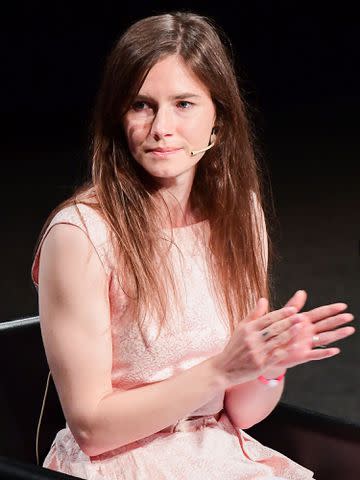
VINCENZO PINTO/AFP/Getty
Amanda Knox during a panel panel discussion titled "Trial by Media" at the Criminal Justice Festival in 2019.Since her acquittal, Knox has developed a new mission in life: to help prevent wrongful convictions, she revealed to PEOPLE in 2017.
As part of that mission, Knox returned to Italy in 2019 to serve as the keynote speaker at a criminal justice conference hosted by the Italy Innocence Project, headlining a panel titled “Trial by Media.”
“To the world, I wasn’t a suspect innocent until proven guilty, I was a cunning, psychopathic, dirty, drugged-up w---- who was guilty until proven otherwise,” she said about the media’s influence on her trial in her remarks, according to Reuters.
Even though the media demonized her throughout her ordeal, Knox has worked as a journalist herself in the years since her release from prison in an attempt to transform her platform into something purposeful.
In 2018, she debuted an unscripted series on Facebook Watch called The Scarlet Letter Reports, which was hosted by Knox and gave high-profile women who had been publicly shamed — including Mischa Barton and Amber Rose — a chance to tell their stories.
“It’s humbling to be here in the position I’m in now, where I can help other women reclaim their narrative,” Knox told PEOPLE. “When at a certain point in my life I thought I was going to live the better part of my life in prison labeled something I was not — with no chance at ever reclaiming my life.”
Knox also hosted a podcast called The Truth About True Crime, which aimed to shed light on cases involving wrongful convictions and media sensationalization. The podcast, which was produced in partnership with SundanceTV, ran for five seasons in 2019.
“I know what it means to be at the center of a story that tantalizes and entertains people. So being able to speak to that when looking at other cases seemed like a really great opportunity,” Knox told Vulture about the podcast.
Italy was ordered to pay Knox nearly $21,000 in damages in 2019

Oli Scarff/Getty
Amanda Knox at Perugia's Court of Appeal in 2011.In January 2019, the European Court of Human Rights ordered Italy to pay Knox nearly $21,000 in damages, costs and expenses, The New York Times reported.
The damages were the result of Italian police failing to provide Knox with legal assistance and an interpreter during her 53 hours of questioning following Kercher’s murder. However, the court did not find that Knox had sustained “inhuman or degrading treatment” as she had claimed.
“Ms. Knox had been particularly vulnerable, being a foreign young woman, 20 at the time, not having been in Italy for very long and not being fluent in Italian,” the court said in its ruling. It also noted that her statements “had been taken in an atmosphere of intense psychological pressure.”
Knox addressed the ruling on her former blog, according to The New York Times.
“I was interrogated for 53 hours over five days, without a lawyer, in a language I understood maybe as well as a ten-year-old," she wrote. "When I told the police I had no idea who had killed Meredith, I was slapped in the back of the head and told to ‘Remember!’ ”
Knox added, “I never should have been charged, much less convicted, of slander.”
Knox married in 2018 and is a mother of two
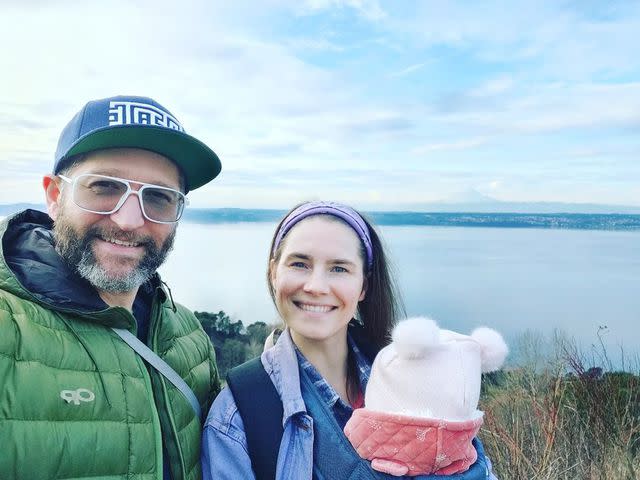
Amanda Knox Instagram
Christopher Robinson, Amanda Knox and their daughter Eureka in 2022 take a selfie.Knox began dating author Christopher Robinson in late 2015 after they met at a local book launch party. By 2016, they had moved in together and in December 2018, the couple secretly married — to “simplify our taxes and insurance,” they shared in a later statement.
Despite their initial nuptials being practically motivated (they later celebrated with a space-themed reception in February 2020), Knox and Robinson did not take the decision to wed lightly.
“I don’t want to get married for the sake of getting married. My hope is that I have a partner with whom I can continue to take on the world ... and I very much love Chris and feel like he is my partner,” Knox told PEOPLE in 2017.
Knox also shared that she thought Robinson would be a “wonderful dad” and looked forward to starting a family with him one day. The relationship milestone came in 2021 when the couple revealed in October that they had welcomed their first child together — a daughter named Eureka Muse Knox-Robinson — after previously experiencing a miscarriage.
Knox and Robinson have kept Eureka out of the public eye, only sharing images of the back of her head on social media. The couple spoke about the decision to keep their daughter’s life private on their podcast Labyrinths.
“She deserves the privacy and autonomy that I was denied,” Knox said.
In August 2023, Knox revealed on Instagram that she and Robinson were expecting their second baby. She shared a photo of herself with her bump on display, along with the caption “Pregspreading.”
Shortly after, she gave birth to their son Echo in September 2023, and the pair later shared the family news on their podcast Younglings.
Speaking to PEOPLE about parenting her future children in 2017, Knox said, “I hope to instill in them the sense that not knowing what to do and asking for help, especially of us, doesn’t mean that they are less capable or less adult. We’ll help each other, and that will be our strength. That’s what my family taught me.”
For more People news, make sure to sign up for our newsletter!
Read the original article on People.


